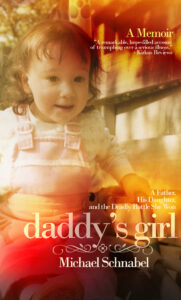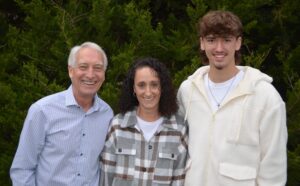Writer Michael Schnabel joins me today to chat about his memoir, Daddy’s Girl: A Father, His Daughter, and the Deadly Battle She Won.

Bio:
Michael Schnabel is the author of Daddy’s Girl, a memoir about the challenges and struggles of parenting through a medical crisis. A graduate of Northern State University, Michael developed his passion for writing and storytelling during his thirty-year career at Bristol-Myers Squibb. Michael lives in Overland Park, Kansas, with his wife, and when not spending time with family, you can find him tending to his 26-acre tree farm. Daddy’s Girl is his first book.
Welcome, Michael. Please tell us about your current release.
Daddy’s Girl is about parenting through a crisis. My 27-year-old daughter, Stephanie, gave birth to our only grandchild and, two weeks later, learned she had Stage 4 Colon Cancer. She had an 8% chance of living five years. The story isn’t about the disease. It’s about her becoming a warrior and how three generations of a family respond to a crisis and form a team to overcome it. Her Mayo Oncologist told us she was cured three years later. He also asked us to share her story since one of the most significant needs for his patients is often hope, and her story boosts that for others. This uplifting book is filled with love, faith, and humor.
What inspired you to write this book?
If my daughter died, I wanted her newborn son to know how much she loved him and how hard she fought to live and be with him. So, I tried to capture Stephanie’s essence and bravery, so he knew her beyond pictures. She never gave up, and we decided to share her story with others after she was cured.

Excerpt from Daddy’s Girl: A Father, His Daughter, and the Deadly Battle She Won:
Life Lesson: Keep Moving Forward
The obstacles people face in life do not define them, but the way they deal with them might. Stephanie has been challenged more in the last year than I have in all of my life. The assaults come in waves knocking her down, but she keeps getting back up. She is not fearless, but she meets each test head on telling herself: Keep moving forward. One day at a time. Never quit trying. I am simply amazed at how strong she’s become.
Kristen and I bring Caden up to visit his mother, and it’s hard to tell who is more excited. Kristen plans to spend the night with Steph, and after visiting hours, Mark will bring Caden home. Midday Nana and I leave the hospital, I drop her off at home, and leave town for work. Our patient’s mental health is refreshed when she and Kristen have a comedy movie marathon in the hospital. It also helps the time pass quickly.
Driving has often been part of my job, and I enjoy it because it gives me time to think. I reflect on everything the team has been through and wonder how we can prepare for the future. How do you prepare for the unknown? The only thing I can think of is to live each day as well as we can and stay focused on that. We can’t change the past; we can only learn from its lessons. We can’t control the future; we can only plan for its probabilities. We can, however, choose what we do at this moment. It’s really all we have. For my sanity, I will try to remember that and hope it makes things simpler. I think about the people who stepped up to help us during this crisis. What would we have done without them? Maybe each of us really can make a difference in this world simply by helping those around us. As the miles drift by, I find myself at peace and remember how blessed we really are.
Stephanie is released from the hospital after the oncologist reminds her to take additional precautions against exposure to germs. He tells her, “You can’t eat any food prepared out of your home, it must be fully cooked, and you should wear a mask when you go out. If there is any concern about what to do, err on the side of safety. Questions?” Steph tells him she understands and appreciates his help. She continues to receive multiple IV antibiotics at home and leaves the hospital with enough for the next 24 hours. Mark and Kristen bring her home at the same time I return from my trip.
That night I tell Steph about my thoughts in the car, and she agrees we need to focus on what’s happening now and do our best. It worked with the surgery, the blood clot, and the sepsis. We didn’t know what to do but did our best with a lot of help from those around us. Something continues to guide us through the terrifying maze of her illness. Is it faith, love, or God? Neither of us knows, so we agree to embrace and cherish each of them. Someone this week told me to hang in there, no storm lasts forever. I tell Steph I like that advice and she agrees. Our faces fill with smiles instead of tears for a change, and we both feel better. Nana hangs a fresh bag of antibiotics, and we all head to bed.
[The above is an excerpt from Daddy’s Girl: A Father, His Daughter, and the Deadly Battle She Won (2023; Armin Lear Press) by Michael Schnabel. All Rights Reserved.]
What exciting project are you working on next?
I am writing a book that tells the story of a salesman while teaching the skills needed to be successful. The story spans a half-century and captures the necessary abilities required to be a professional salesperson.
When did you first consider yourself a writer?
I began writing presentations and training programs during my 34-year career with Bristol-Myers Squibb. After retiring, I started working on a salesman’s story. That is still a work in progress. When I finished Daddy’s Girl and read the professional praise book reviewers gave, that was the moment I believed I was an actual writer and author.
Do you write full-time? If so, what’s your workday like? If not, what do you do other than write and how do you find time to write?
I am retired but do not write full-time. Instead, I split my time writing and working on our 26-acre tree farm. The amount I give to each is determined by weather, deadlines, and my grandson’s soccer schedule.
What would you say is your interesting writing quirk?
Listening to Chuck Wild’s meditative music helps me relax, stay focused, and be more creative. Meditation also helps me reset when I need clarity.
As a child, what did you want to be when you grew up?
I wanted to be a jet pilot. I took ground school in college but didn’t have the money for flight time. After graduating, I became emersed in work and started a family with my childhood sweetheart. I never learned to fly, but I spent fifty-five years with that wonderful woman and have a close, loving family.
Anything additional you want to share with the readers?
This intimate story captures our emotions, thoughts, and actions as we help Stephanie. When we learned the diagnosis, we weren’t sure what to do. We looked for something to guide us but didn’t find what we needed. Slowly we found our way, and years later, Stephanie was cured. Everyone asks how she did it. Daddy’s Girl answers that question and leaves a path that others in crisis may find helpful. Readers will share our love, tears, and laughter. I also hope they learn something about parenting through a crisis.
Links:
Website | Facebook | LinkedIn | Amazon | Barnes and Noble
